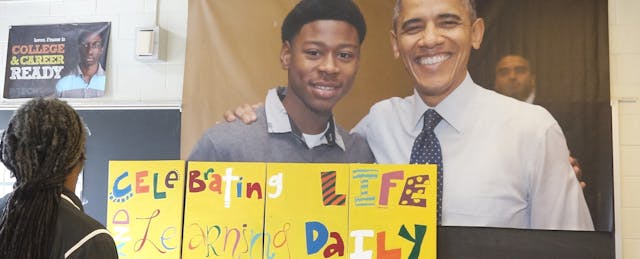Pathways in Technology Early College High School (more commonly known as P-TECH) in Crown Heights, Brooklyn opened its doors in 2011. The public high school's claim to fame was its unique model serving grades 9 to 14, offering students associate's degrees in STEM majors by the time they graduate. Backed by companies like IBM, and championed by the New York City Department of Education and even former President Barack Obama, the unique model has spread from one to 60 schools across the globe—all in under six years.
Expect that number to grow even more rapidly. Earlier this May, a federal bill supporting the creation of more technical schools similar to P-TECH passed through a committee and is headed to the House floor for a vote. In addition, states like Texas are looking to build similar schools in their districts, passing legislation to make that possible.
IBM is riding this wave of support, noting a corporate obligation to foster America’s workforce. This week the company announced plans to create 80 new P-TECH schools across the globe, Stanley S. Litow, former Deputy Chancellor of New York City Schools and IBM’s Vice President of Corporate Citizenship and Corporate Affairs, told EdSurge he hopes to work together with districts “to build a model that meets the needs of students.” In total, he expects there will be 140 P-TECH style schools around the world soon.
However, while IBM focuses on expanding the model, founding P-TECH principal Rashid Davis is focusing on making sure the design they have works.
This summer will mark the official end of the P-TECH journey for the first cohort of 104 students who joined in 2011. As of today, P-TECH school leaders expect 56 percent are on track to graduate on-time with an associate's degree. These numbers are higher than the national average (at 5 percent according to a 2014 report from Complete College America), but dissatisfying to Davis who co-designed the school with the goal of graduating students with an associate's degree.
According to an NPR report published in March of 2016, "21 percent of grades earned by [P-TECH students in college courses [the fall of 2014] were D's and F's." These grades are problematic since students are required to have a "C" or 2.0 or higher in order to earn college credit, requiring them to repeat courses and graduate later. However, in spite of these realities, Davis suggests that the six-year program might be too long for students who get anxious when they see friends in other schools graduating in four years and going away to college. “We know it takes too much time, so we are trying to cut that time down,” says Davis in an interview with EdSurge.
“The biggest lesson [I have learned] is the earlier the better,” Davis continues. “Many people say students are not mature enough, so they cannot handle college level work, but we need to start sooner because that connects them.”
Most P-TECH students start college-level courses the summer after their ninth grade or freshman year. Davis thinks the kids are ready for these courses even sooner—as soon as they start their first year at P-TECH. This is possible, he believes, since college coursework is already integrated into the school model. That way, Davis explains, most students see college courses as “just another class.”
P-TECH is not a charter school, it operates like a normal high school with no admission tests or outside funding, and many of the students are from poor communities where pressures from outside of the classroom can affect grades and completion rates. To combat this, Davis has taken several measures to keep his students motivated while they are in P-TECH.

One thing Davis does is put up posters of students who graduate to inspire the others. “That is my sister,” says BryAnn Sandy, a 17-year-old-student graduating early from P-TECH with an associate's degree and heading to Georgetown University in the fall. She was pointing to a poster on the wall put up by Principal Davis. Her sister is one of the students who finished the six-year degree program early.
In addition to pinning motivational posters, Davis is looking to connect with middle schools, noting that many of the students coming into P-TECH are ill-prepared for the work they are about to encounter.
“The most challenging thing for me was my transition from middle school to P-TECH,” says Oscar Tendilla, another 17-year-old graduating early. “Not many people know this, but I was horrible in middle school. I had 55s just because that was the minimum grade the school could give me.”
Tendilla described himself as failing, unprepared and unmotivated. Yet he saw entering P-TECH as an opportunity to “redeem himself” to his parents. He says that meeting Davis and other teachers on staff, in addition to taking summer courses in a supportive environment helped him change his path.

“It’s about relationships,” says Davis. “More than 80 percent of graduating classes have been college-ready. That’s not the norm in the city, but I think that they are responding to the culture because they see themselves and they feel connected.” This will be the school's third group of graduates (two groups graduated early).
For students not finishing their degrees in the six-year time period, Davis is pushing them to continue. “We are literally meeting right now to have a conversation with them and their parents, to say this is what we need to do to make sure they know they are too close to completing their degree to give up now,” says Davis. “Completion is the goal.”
IBM’s Stanley Litow is optimistic about the school's completion rates describing P-TECH as a model built to scale that works for students. “At the end of the day, the college completion rates for the school breaks all of the records for college completion in the United States, it’s [much] better than the national average.”


